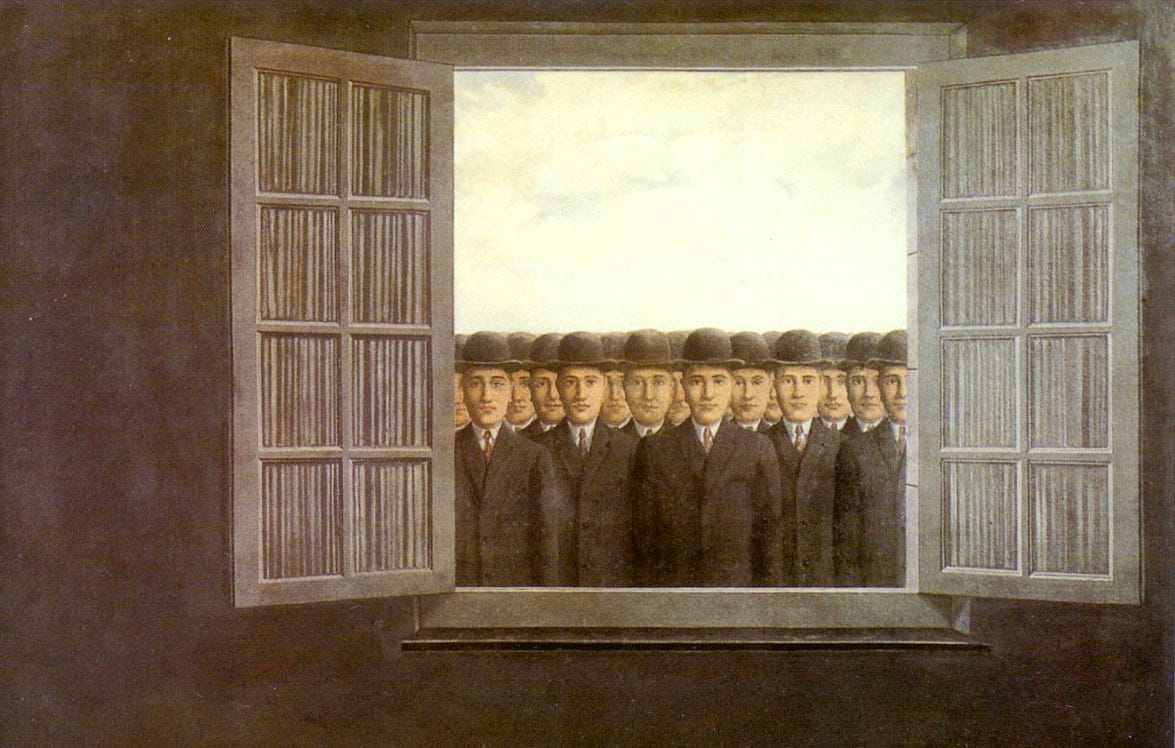Nonsense and Malaise: Astrological Insights for Maneuvering the Hive
Each time you visit social media you're exposed to the moods and disruptive field of the mob. Understanding your natal Mercury can help you navigate the wilds.
TO UNDERSTAND WHY SOCIAL MEDIA dominates internet culture, let’s consider what psychologist Arnold Mindell calls field theory. Also known as field consciousness. Mindell posits that when a mass of people comes together, a field of consciousness is created.
Mindell writes:
Field concepts are not new. Since ancient times the Tao was understood to pattern everyday life. Ancient Chinese thought of the Tao as a field with lines of force, which were called ‘dragon lines.’ This spiritual psychophysical field was imagined to exert forces not only on the health and state of mind of people, but also on the geology and geography of the earth.
The old-fashioned internet hinted at the promise of field consciousness. But in reality, whatever you ventured to share online evaporated instantly into a void. The recourse was to hope that someone would share a link to your web page. Or, if you felt flush, you might devise an advertising campaign to lure traffic to your online presence and content.
When Twitter and Facebook arrived, the internet was already familiar with Friendster and MySpace. Despite their short-lived popularity, these earlier social networks failed because whenever you posted on their platforms, it felt like you were shouting into an empty hallway.
But posting to Twitter’s or Facebook’s ‘wall’ (or feed) felt like a ‘live time’ happening where fellow readers and posters could respond instantly—and usually did. This changed everything—finally, the shared energetic field became a reality, as did the culture’s encroaching mental breakdown. (See Cambridge Analytica, Brexit, and the election of Donald Trump).
Residual Psychic Residue
Each time you stop whatever it is you're doing in ‘real life’—cleaning the house, working on your book, or balancing your checkbook— to log into social media, you’re stepping straight into the vortex of the undulating hive mind with the mob’s contradictory and distracting impressions.
And this is the central reason, perhaps only unconsciously, that some people are intimidated about participating in social networks. As I told a client the other day, because Facebook resembles the politics and cliques from one’s high school days, it can generate an intimidating (if not traumatic) response that’s repellent.
For those who can overcome their apprehension, social media can be a hypnotic experience that fosters a score of contradictory experiences. Everything from narcissistic reveries to alarming cries for help.
Conversely, different talents and qualities within your nature might be highlighted in a way that garners deserved attention. It all depends on how we enter the amorphic field and manage its influence on our nervous system.
Underscoring this phenomenon, virtual reality guru Jaron Lanier warned in the New York Times:
The researchers claim that they have proved that “emotional states can be transferred to others via emotional contagion, leading people to experience the same emotions without their awareness.”
This latter condition is doubly concerning for Americans, as the national birth chart contains a gnarly Mercury-Pluto opposition, making American culture particularly prone to propaganda and conspiracy theories.
Before the internet, this opposition worked at an almost subsonic level of apprehension. Dad would come home, pop a beer and sit back while Walter Cronkite decorously spoonfed him the news of the day that was deemed most important.
In his book Taking the Risk Out of Democracy, Alex Carey explains how Americans are particularly susceptible to propaganda due to our undue respect for wealth and commercial success compared to other civic virtues.
With the internet came the loss of cultural gatekeepers, critics, social monitors, and editors. What used to be the purview of an educated cadre of media managers (which included hyper-skilled propagandists and conspiracy wizards) was now a cacophonous, open-ended feeding fest.
Day by day (or byte by byte), the entire global community was emersed into the roiling cauldron of the collective id.
We are still attempting, rather badly, to manage the fallout of this techno-mutation. And it isn’t going well. As the internet’s influence came to dominate every aspect of modern life, democracies across the globe began to fail.
Mercury’s Reflective Yield
In the astrology of the human body, the planet Mercury acts as a conductor between our brain and the world beyond our skin. A kind of quicksilver antennae.
The impressionability of Mercury is astounding and slightly alarming. If you’ve ever seen (and prodded) a blob of Mercury sitting atop a surface, you’ll recall what I’m talking about.
Mercury is an exact reflection of whatever it absorbs from the world it observes. Touch or prod it, and the blob will eventually yield and split itself in half, with none of its reflective consistency disturbed.
Metaphorically, this process can play out ad infinitum. Especially while trawling the realm of social media.
One bit of information morphs into another bit of information. Because the knowledge-gathering part of the brain triggers reactions similar to the drive of our sexual instinct (see video below), it’s easy to see why info-glut is also associated with dopamine burnout and addiction.
In Greek and Roman myth, Mercury-Hermes stole unabashedly from each god and goddess in the pantheon. I read this as Mercury’s ability to simply take in and mirror back whatever power or jurisdiction a particular god was associated with.
For this reason, it behooves us to better understand how our Mercury placement at birth can best operate while maneuvering the wiles and horrors of social media.
We're only half human if we are indiscriminately mirroring every interaction that hijacks our attention. The rest of us has gone missing into the wily roach motels devised by techno mavens with their commitment to claim all our identity and attention for whatever corporation they work for.
Debbi Kempton-Smith wrote one of the best descriptions of the astrological Mercury that I’ve ever encountered:
“The planet shows the style in which you speak, the rhythm of your thoughts (fast? slow? intuitive? superficial? practical? vague?) and indicates what your mind is really on when you gaze out a window.”
Here are some guidelines and points to consider related to your Mercury and its relationship to social media and communicating successfully with others online. (Not sure about where your Mercury resides, you can do your chart up for free here.)
Mercury in the Fire Signs (Aries, Leo, and Sagittarius)
Fiery Mercurys have their attention spread into areas of life that most would either miss or avoid entirely. Remember how Mercury crawled out of his cradle as an infant, discovered a tortoise, gutted it, stretched hide over the empty shell, added some strings, and created the world’s first lyre?






